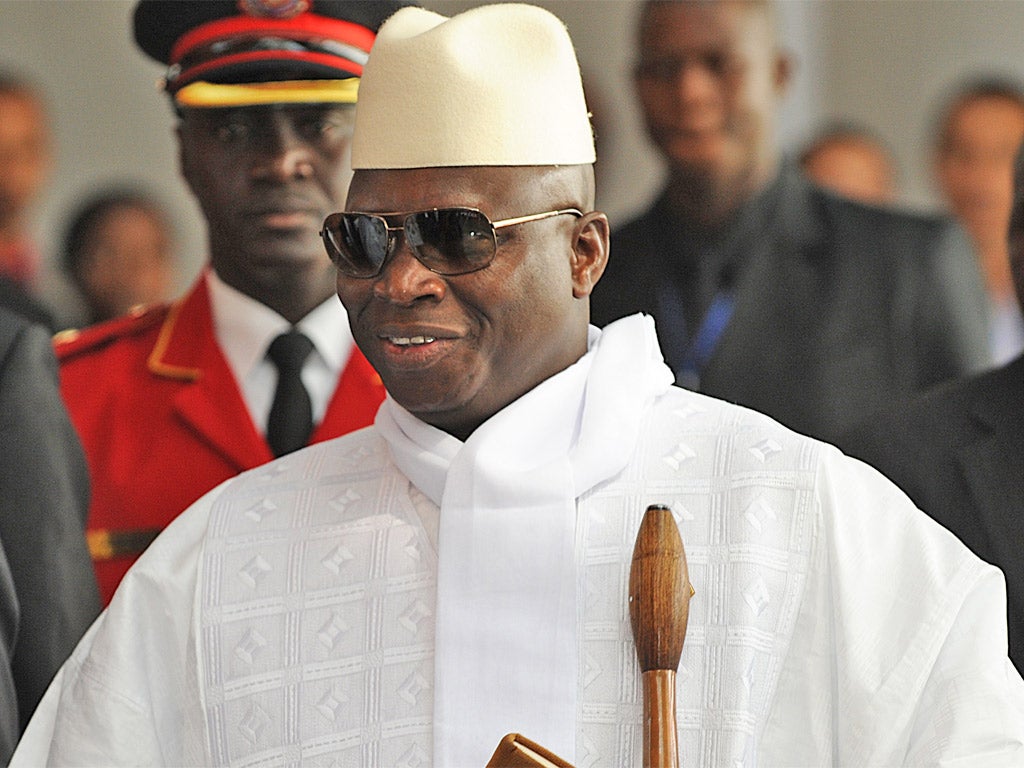Inside Gambia: A cripplingly poor country ruled by fear
On the day that President Yahya Jammeh pulls out of the Commonwealth a former resident describes what day-to-day life is like

Your support helps us to tell the story
From reproductive rights to climate change to Big Tech, The Independent is on the ground when the story is developing. Whether it's investigating the financials of Elon Musk's pro-Trump PAC or producing our latest documentary, 'The A Word', which shines a light on the American women fighting for reproductive rights, we know how important it is to parse out the facts from the messaging.
At such a critical moment in US history, we need reporters on the ground. Your donation allows us to keep sending journalists to speak to both sides of the story.
The Independent is trusted by Americans across the entire political spectrum. And unlike many other quality news outlets, we choose not to lock Americans out of our reporting and analysis with paywalls. We believe quality journalism should be available to everyone, paid for by those who can afford it.
Your support makes all the difference.The gigantic posters usually appear at the main crossroads of the Gambia’s few main roads. At well over 20 metres high they show the president, Yahya Jammeh, a big man, dressed in his usual white flowing robe, narrow white felt hat, and holding a traditional ornately carved wooden staff. Put up before elections, and still there months, years, after the polls have closed, the message to the Gambian people is clear and precise – “It is your scared duty to vote for President Jammeh.”
Duty is not the reason Jammeh has stayed in power since 1994. As a young army lieutenant, he seized power in a relatively bloodless coup from the Jawara regime that had ruled the narrow West African state for 30 years. Despite the structures and formalities of a democracy, Jammeh rules by authoritarian fear.
In his own words, the key to survival is clear enough. During the 2006 election he promised : “I will develop the areas [the administrative regions] that vote for me, but if you don’t vote for me, expect nothing.”
For the foreign tourists who travel only from Banjul airport to the high-density Senegambia strip and back, their view of the Gambia is limited to a beautiful beach, hotel after hotel, and a brightly painted fishing village. It could be anywhere.
But beyond the tourist zone, narrow strips of tin shacks and breeze-block houses can be dominated by recorded prayers booming from competing mosques. Around 90 per cent of Gambians are Muslims, mostly Sunni.
Then out along the highway that stretches east from the largest town, Serakunda, or in routes out of the old port area of the capital Banjul, the army check points come regularly, appearing every mile or two. Groups of soldiers sit on beat up chairs; one or two stand in the centre of the road, armed, silent, their hands eventually extended in reflex to receive the few Dalasis [the local currency] required to pass.
Drugs from neighbouring Senegal, that surrounds its borders on three sides, is an issue, but
The Gambia is Africa’s smallest country. On its Atlantic coast it’s less than 50 kilometres wide, stretching towards Mali at just over 300 kilometres in length. A snaking river runs through it that accounts for some 11 per cent of the total land area. A journey along the River Gambia, towards the former slave town of Janjanbureh, reveals decaying or abandoned groundnut farms and factories that should be contributing to a slim GDP.
For American tourists who come to the Gambia to experience the “Roots” tour – based on the locations of the award-winning US book and TV series that supposedly tracked the origins of African slavery – 18th and 19th century history appears more important than the current struggle with poverty.
And the Gambia is poor, cripplingly poor, with over a third of its population of 1.7 million surviving below the United Nations poverty line of $1.25 a day. Beyond Serakunda’s busy street-side industries, and hand-to-mouth trading, and away from Banjul’s decaying colonial centre, around 70 per cent of the population work small plots of village land to survive.
Foreign aid and remaining links to Britain, its former colonial master, have helped prop up the Jammeh regime, despite serious questions marks over the legitimacy of the last elections in 2011.
The country’s largest employer is the MRC campus at Fajara near Banjul, where internationally-recognised medical research takes place. Research money includes funding from the UK government and the Us Gates Foundation.
The MRC used to be involved in Aids research. However Jammeh’s claim a few years ago that he had personally developed a herbal and vegetable remedy for the disease that would work in three days, and his funding for a special clinic to administer the cure, saw the MRC diplomatically move this element of its research out of the country.
As criticism of the president often comes at high cost, getting locals to talk politics is difficult. The country’s newspapers are pacified supporters of the presidency, paying heavily for print licences. TV is state-controlled.
Critical journalists making too much noise? They are jailed. Reports from Amnesty International make uncomfortable reading, citing state-sanctioned use of torture and unlawful arrest.
Yet day to day life continues. The president threatened executions for a large number of prisoners last year. Then backed down. This year he declared a half day of stay-at-home contemplation for Gambians, and the streets emptied. Then the rule was changed.
Foreigners who have settled in the Gambia, invested in businesses, find a niche, stay quiet, and trust the president will leave them alone.
Today, when they learned Yahya Jammeh had unexpectedly pulled out of the Commonwealth, many were asking why, and fearing, speculating, what might lie behind his latest decision.
Join our commenting forum
Join thought-provoking conversations, follow other Independent readers and see their replies
Comments